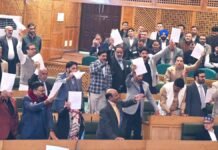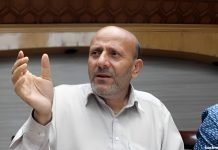
On the sultry afternoon of August 22, 2019, the muezzin was sonorously calling people to Zuhar, the afternoon prayer in the Jamia mosque of Murran, 3.5 km from the main Pulwama township. The Azaan was going on when Ratan Lal Koul breathed his last.
A pall of gloom descended on the whole village and people from all walks of life thronged his residence for condolences and show solidarity with the bereaved family.
Ratan Lal had slipped into a coma after being treated at Apollo Hospital, New Delhi. Doctors had said that he was suffering from rarest of the rare carcinoma involving his prostate gland and small patches of the cerebrum. After undergoing initial doses of chemotherapy, he had gone into a vegetative state.
Born in the early 1940s at Murran hamlet in a well-to-do family, he was the only male child in the extended family. He was brought up with lots of love and generously pampered by his indulgent mother, uncles and aunts, much to the chagrin of his father, Pandit Deenanath Koul, who belonged to the elite league of teachers like Gangadhar Dehati – the best ever teacher produced by Murran village. Pandit Deenanath had shaped careers of most of his students and wanted his son to fill in his shoes.

Ratan Lal, however, found the shoes of his father too big to fill. Instead, he chose a different path. He started his career as a chemist and earned name, fame and immense respect.
A humble soul, a suave human being, a great ambassador of communal amity, a social activist, a philanthropist, a humanist, a jovial fellow, a chemist, a trade union leader, an altruist – all dimensions rolled into one personality called Ratan Lal Koul.
Ratan Lal would treat patients at his medical shop-cum-clinic at Bouni Baagh (Chinar Garden) in the heart of Murran. Soon he became a household name not only in his native village but also in the neighbouring villages. He was a medico unto himself, for his immaculate and spot-on diagnostic acumen and awe-inspiring clinical skills. He always prescribed and sold standard medicine and never compromised on quality.
In the absence of a maternity hospital in the area and hardly any means of transport available during the 1980s, he along with a couple of Muslim midwives would take care of the expecting mothers at the time of childbirth. He would ride a horse to reach the far-flung areas and attend to the expecting mothers at the crucial time of parturition. I was also born at the hands of Ratan Lal.

Unfazed by adversity, Ratan Lal didn’t leave his native village during the most tumultuous period of the early 1990s. He tried his best to persuade other Kashmiri Pandits not to leave their motherland. He always sided with his Muslim brothers in weal and woe.
Philanthropy was ingrained in his DNA. He would help the needy and the destitute – mostly Muslims. He would provide the medicine free of cost besides helping them monetarily. To him, serving mankind was akin to serving God.
A single knock at his door even in the dead of night and you would find him ready with his kit to go anywhere to treat his patients. Loads of experience he carried under his belt and the qualities of his head and heart would ensure speedy recovery of his patients. In return, he would get blessings straight from their heart. It was the result of these blessings which made Ratan Lal live a king-size life.
Ratan Lal Koul was a social activist who would raise issues facing his village with the concerned authorities and get them redressed speedily. His demands for his village would often find mention in Sheharbeen, the evening news capsule being broadcast from Radio Kashmir Srinagar, or get reported in the local dailies.

A symbol of Kashmiriyat, he would religiously visit the local Shiv temple at Brari Mouj in the wee hours after paying obeisance at the mausoleum of Hazrat Mir Sayyid Hussain Andrabi (RA) aka Baba Haji. He would regularly visit the shrine of Sheikh-Ul-Aalam (RA) at Charari Sharief. On the occasion of Eid Milad, he would arrange special beverages and milk for the devotees outside his medical shop.
Ratan Lal was a great son of the soil who was an ardent votary of promoting communal harmony. He would collaborate with the Auqaf (mosque committee) of the Jamia Masjid to reach out to the needy and work for the betterment of the village. He was a humanist to the core and serving humanity irrespective of colour, class, caste or creed was an integral part of his persona. He always wanted to see his village become a Model Village in the true sense of the term, where communal harmony, fellow-feeling, empathy, compassion, mutual love and respect would reign supreme.
As a member of the pharmacists and chemists, Ratan Lal infused a new spirit into the Drug Association of Pulwama after he was elected its president with an overwhelming majority. He remained president of the association till his death. He vociferously raised the issues facing the chemists of Pulwama with the concerned authorities and ensured their timely redressal. His impeccable character, altruistic spirit and moral uprightness earned him respect with the authorities and he became a name to reckon with.
Ratan Lal’s funeral bier was bedecked with marigold garlands as flower petals were showered on it by all and sundry. The bier was shouldered by the villagers as he had shouldered their myriad problems during his lifetime. A sea of people participated in his last rites despite shutdown and suspension of Internet and cellular services after the abrogation of Article 370. With moist eyes and trembling hands, they finally consigned his mortal remains to the fire.
Ratan Lal Koul, you have left a large hole that can never be filled. They say, they only live who live after death. You may not be present among us in a physical sense but your legacy will surely live on for times to come. Unarguably, you were the sparkling Ratan (gem) of our village. Rest in peace.
Follow Us
The Kashmir Pulse is now on Google News. Subscribe our Telegram channel and Follow our WhatsApp channel for timely news updates!










